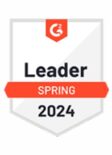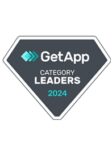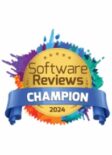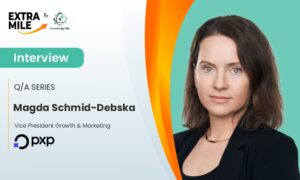Host: Hello everyone, welcome back to another episode of ExtraMile by KnowledgeNile, an interview series that bridges the gap between industry leaders and enthusiasts. I'm your host Sudakshina and we are here to discuss the latest innovations, tech trends, marketing practices, expert insights and a lot more.
For today's conversation, we are excited to have Jon Ferrara, CEO of Nimble, a smart CRM company that helps businesses build stronger customer relationships without the complexity of traditional sales tools.
Jon has been a pioneer in CRM for over 30 years and is now leading Nimble in making relationship building easier for everyone. Welcome Jon, it's great to have you with us today. How are you doing?
Jon: I'm doing great. I really appreciate the opportunity to have a conversation with you so that we might add some value to your audience about how they might build better relationships to help them grow and achieve their dreams.
Host: That's great. So, you have been a leader in CRM for over 30 years, starting with Goldmine and now at Nimble. So, what made you come back to CRM space after Goldmine and what gaps do you see that Nimble needs to address?
Jon: Well, when we founded Goldmine, there was no CRM. There was no Outlook. There was no Salesforce.
There was no HubSpot. There was no market automation. There was really nothing in the market that enabled a team to build the relationships they needed to achieve their business goals.
Back then, people ran on daytimers and spreadsheets, and we pioneered contact management, Salesforce automation, CRM, and email marketing before those terms existed. But at the heart of Goldmine was contact management, relationship management. And I feel that CRM forgot about the R in CRM, about relationships, that CRM systems today aren't built for relationships.They're built for command and control and reporting. And that's why when most businesses buy a CRM, they have to go out and buy a multitude of other tools that enable the sales reps to engage and close business. And I started Nimble so that we could fix that problem, that we could put the R back into CRM, that we could build a relationship manager for not just salespeople, but the whole team.
But that has specific features that salespeople needed to achieve their goals, like the ability to prospect in LinkedIn in their email, and to be able to enrich leads automagically, and to be able to send out sequenced emails, and all the things that they need to do to engage in closed business. And most CRM systems today don't have these things, and you have to go out and buy separate tools to do it, and especially being able to work with things like social media. LinkedIn is a key place to build relationships, and Nimble enables companies to prospect smarter in LinkedIn, put them on sequences inside of our CRM, engage in closed business.
But also, Nimble is able to be used by everybody in the company because not every relationship is dollar denominated. In fact, your team reached out to me to interview me. You're not asking me to pay you for this, and there's no dollar or deal related to it.
So, you have probably a process and an outreach workflow that you do, and I'll bet you probably do it on spreadsheets. You should be doing it in Nimble.
Host: Seriously, keeping CRM simple yet powerful is the key. So, most CRMs are designed for big companies, but Nimble focuses on small businesses. Why did you choose this direction, and how does Nimble make CRM easier for teams who are not sales experts?
Jon: You know, small businesses want to behave like big businesses, to have the processes and systems in place to attract and close business. But the costs and complexities of most CRMs are out of reach of most small businesses. And really, Nimble's designed not just for small businesses, but teams within medium and large businesses because they behave like small businesses.
So today, if you wanted to go out and get a CRM, it's not enough. You need email marketing. You need something that does prospecting, like LinkedIn.
You need something that enriches leads with people and company data. And you need a tool that enables sales reps to outreach effectively. Each of the tools I just mentioned are $100 per user per month, and they're complex.
They require an administrator to run them all. And even after you do all that, most salespeople aren't sophisticated enough to use all those disparate packages. And so Nimble simplifies the sales and marketing technology tech stack, the costs, and the effectiveness of having a singular system for sales, marketing, and overall company engagement.
And we really believe that that market, the small business and team market in medium and large businesses, is ignored because most CRMs have priced their systems north of $100 per user per month. And it's not enough to just get the CRM like I shared earlier. And so, we believe that the market for small businesses and teams of larger businesses is wide open.
And that's what we're finding in our growth.
Host: It really makes sense. The company prioritizes relationship intelligence over ideal tracking. Why do you think traditional CRMs fall short in this area?
And how do you feel that gap between sales and meaningful customer relationships?
Jon: Well, you have to go back to the history of CRM and look at its roots. Its roots are in contact management. And that's because products like Goldmine and ACT really founded this marketplace.
Outlook came in and they essentially became the standard contact tool for businesses. And yet Outlook doesn't really provide good relationship management, but more importantly for a team. But more importantly, the CRM systems today aren't really about relationships.
They're about command and control reporting. And so most sales reps don't live in their CRM. They live in Outlook and maybe LinkedIn and they go and feed the CRM in order to keep management off their back.
I like to say the reason they call it Salesforce, you have to force salespeople to use it. The biggest cause of failure of CRM is lack of use. There's 225 million global businesses, less than 1% use any CRM because they're not built for the purposes that human beings do business about, which is engaging and building relationships to stay top of mind with their prospects.
So, when their prospects need your products and services, they pick up the phone and call you and they drag their friends with them. And so, relationships will always be the key to business success. Yet CRM systems aren't about relationships.
They're reporting systems. That's why salespeople hate them and they don't use them. But CRM companies still sell to sales managers and owners and sales reps really are lacking the tools that they need, which is why they have to go out and buy all those technology tools to adjunct the CRM to enable them to do their job, which is to engage with people at scale in order to connect and qualify and close.
And so, relationships will always be key to life's success. And business is built on people who like, know and trust you and naturally the heart of Nimble.
Host: Absolutely. Relationships are meant to drive businesses and not just transactions. So, what are the best practices for email marketing? Can you provide some examples of successful campaigns?
Jon: Well, I can tell you what you shouldn't do. You shouldn't just blast people with a generic message and fill their inbox with crap. I'll bet your inbox is filled with automated emails from companies who are trying to get your attention.
And really, the more digital we get, the more human we need to be. You really need to stand out from the marketing that's happening to your prospects and customers and be human. You need to be clear.
You need to be able to segment your targets intelligently and then craft messages that are targeted to your prospect about how you might help them grow succinctly. And then to reach out to them, not only with the email marketing, but to connect with them and touch them on their social identities and make sure that you do your homework to learn about who that person is and what their business is about and clearly state how you're adding value. Don't send generic messages and make sure you're delivering how you're going to add value to that person because nobody cares about how great your products are or how great your services are.
They care about how they could be great. So, stop talking about yourself. Stop talking about your products.
Start talking about how you might help other people become better, smarter, faster. And more importantly, to make sure your email marketing system is integrated with your sales automation tools that you give to your reps because most companies have a separate email marketing system like MailChimp or Constant Contact. And then they have a CRM that the sales reps use.
And then maybe even a third product, which is the templated email tracking outreach software for your sales reps to connect and their disparate systems. And they don't work well as silos of information. Really, sales and marketing should be like peanut butter and jelly.
And today it's more like oil and water because you have all these disparate systems that small businesses need to purchase in order to achieve their goals. And that's why we built a simple, smart sales and email marketing CRM that focuses on relationships that's affordable with a single price of just $29 per user per month, as opposed to the hundreds, if not thousands, that similar systems cost when you build them out of separate siloed products.
Host: That was really a great advice. Personalization and relevance really do make a difference. So, AI is reshaping CRM's predictive analytics, chatbots, and automation. How does Nimble integrate AI without the human touch in customer relationship?
Jon: Well, number one, it's really hard to prepare before a call, whether you're actually going to be meeting with somebody, calling them, or even if you're emailing them. Like I shared earlier, it's your job to get to know somebody, who they are, what their business is about. And I used to teach people in the old days, when you go into somebody's office, look at their walls, look at the books they read, the degree of the school they went to.
Synthesize what you might share in common with that person. I call it the five F's of life, family, friend, food, fun, and fellowship. These are the softer side of commonalities that you can connect to share what you have in common, to build intimacy and trust that you need to get them to open up to you about their business issues, which as a professional, you might solve.
And today, it just takes a lot of time to do all that. With Nimble, we can do it automagically for you. So we have a prospecting tool that plugs into your Chrome browser or any other browser that you use, that when you're in LinkedIn and you're looking at a contact record or in your email inbox in Google or Microsoft, and there is a new person that you're trying to connect to, Nimble will automagically build a record using AI that will essentially build a contact record with the people and company data that you need in order to better understand who that person is and what their business is about, and even create a smart summary about them, and soon be able to automagically tailor an outreach email or a series of emails that you might send to that person using Nimble's email templates and sequences to be able to outreach to that person, not in a generic way, but in a tailored way that actually demonstrates that you've taken the time to learn who they are, what their business is about, and you're outreaching to them with a clear message of how you will add value to them, putting them at the center of the story as the hero, showing them how you can help them grow and achieve their dreams.
And so, AI, I think, used properly, it supports the human engagement, but I don't believe that AI should run alone as a bot because I think that the human interaction will never go away. In fact, like I shared earlier, the more digital we get, the more human we need to be. And that's what's going to help you stand out from the automated bots that are blasting your prospects and customers today.
Be human, be clear, stand out from the crowd, and even make mistakes because mistakes show your humanness and help you to stand out from the crowd.
Host: Really nice balance. AI should really help relationships and not replace them. So where do you see CRM technology heading in the next five years? Do you think AI will replace salespeople or will it help them to build better human-driven relationships?
Jon: Well, like I shared earlier, I think that we're all so busy that we don't take the time to properly prepare before every meeting. And there's a lot of contacts that get lost in the shuffle of using all these tools. And I really believe that AI can help us to do our jobs better and that they won't replace human beings, but they'll support them so that when you are actively engaging with another person, that you have the tools and the knowledge necessary to clearly communicate how you're going to add value to that person and their company so that you do stand out from the crowd.
And you could use AI to identify patterns in your business, which types of prospects work best, which processes work best to close those customers, and which processes work best to then implement and deliver the services and support those customers so that they not only come back but they drag their friends with them, they give you recommendations and referrals and give you great reviews. And so, AI will not replace humans, but I do believe that they make our jobs easier so we can spend time doing the important thing, connecting with others, spending time asking a few questions, and then listening to people. Because if you actually listen to somebody, they'll fall in love with you because we're all desperate to be heard.
And you'll learn things about them where you'll be able to blow wind in their sails and add value to whatever endeavors they're working on, and they will then come to you for your products and services because you're standing out as a trusted advisor and a friend.
Host: That's absolutely correct. So Nimble recently added PhoneBurner and email marketing integrations. Would you like to share any upcoming features or partnerships you're excited about?
Jon: You bet. I think that every business today struggles with the disparate stack of technology tools that they need to buy in order to do basic sales and marketing. And Nimble helped pioneered social selling and social CRM by integrating tightly with LinkedIn and other products to enable companies to prospect smarter and close business.
What we did recently with what you mentioned, the email marketing add-in, is we saw that companies were having to go out and purchase separate email marketing tools to capture leads from their website and then put people on drip tracks in order to nurture those leads in order for them to then lead qualify them when they're ready to be handed to a sales rep who would then have to go out and put them on separate sequences from their own personal emails in order to connect and qualify and close business.
And all these tools, as I shared earlier, cost hundreds of dollars per user per month. The email marketing system costs thousands of dollars per user per month. And it's not just email marketing that you need to use in order to engage and listen with your customers because you need to have tools on your websites for a chat in order to allow the person to ask questions right in the moment of discovery.
If they do open up a chat, that chat might switch to text or phone or email or some other means of engagement. And we started our engagement engine with email marketing. Soon we'll roll out chat, text and phone in two-way conversations for not just sales, but also service and other means of engagement in your business because it's not just sales and marketing people that you have in your company.
And it's not just prospects and customers that you connect to. I'm an example of a different type of constituency that you connect to at your business. And that's biz dev.
That's PR. It's content. It's SEO.
And so, with Nimble, you have a CRM that can be used by the whole company with the specific features that you need for sales and marketing and also engagement by the non-sales people for outcomes other than deals. So I wouldn't be put on a deal pipeline at your company, but you might put me in a workflow that enables you to first outreach to me and say, Hey, Jon, we'd love to interview for And then if I reply to then schedule me for a meeting or to send me the materials necessary to prepare, and then once the meeting is scheduled to the follow up to do the promotion and the social media sharing of the interview, this is all a workflow process that you probably do internally manually with spreadsheets.
And so Nimble has a CRM today that we have released not just deals and basic sales and but also workflows in the future. We're going to be releasing beyond the email marketing, all kinds of engagement engines that enable you to listen and engage with the customers across multichannel and using AI infusion into all of that, because it's a lot of work to research who companies are to analyze who people are and their past and present and future and then tailor a message to them, whether it's an individual outreach or a series of outreaches that are clear, concise, how you're going to help them grow. And Nimble's AI can automatically build records.
It can automatically build these outreach messages and then identify trends and patterns that help you to tune your best practices of which type of people to prospect, what messages and materials to send them and what channels to engage and communicate to them on. These are all things that the average small business or team within larger businesses struggle with today. Nimble makes it easy, fun and affordable.
Host: That sounds like great updates are on the way. So, with that, Jon, it was an incredible conversation with you. Thank you very much for joining and sharing insights on CRM, small businesses, growth and future of relationship building.
Jon: You bet. It was my pleasure. Thank you so much.
Host: Thank you so much. Thank you everyone for joining us today. I am Sudakshina signing off. See you in our next episode of ExtraMile by KnowledgeNile with our next extraordinary leader on board sharing their thoughts and knowledge. Till then, stay tuned.
Tune Into Our Other Informative Interviews:










